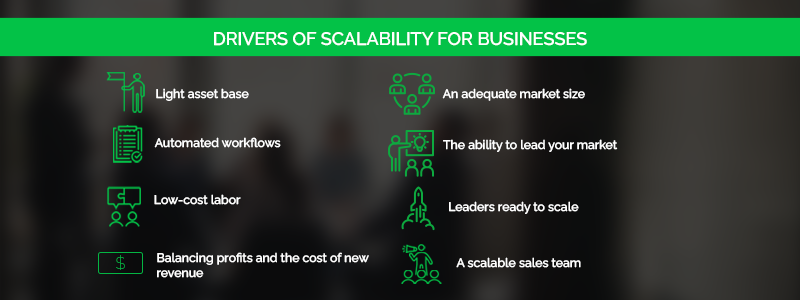Key Drivers of Scalability for Sustainable Growth

To avoid roadblocks to growth, focus on key scalability drivers

If you want your business to advance, you can't just focus on growth; consider scalability. Successful, sustainable growth must be scalable. Scalability means growing revenue without incurring excessive costs.
Businesses that aren't scalable hit roadblocks when they try to grow. They can't earn new clients because they lack the right resources and infrastructure. Bringing on new clients loses them money.
To grow, consider whether your business is scalable at a base level. What drives scalability for sustainable growth? This article walks through the top drivers of scalability, including assets, processes, labor, leadership, sales, and more.
Asset base
Your asset base is one of the key drivers of scalability. To be scalable, your business should have a relatively light asset base. In other words, you don't want capital assets -- land, buildings, factories, machinery, etc. -- weighing down operations.
Imagine a manufacturing company that makes its own widgets. The company's current equipment is at capacity, and to make more widgets, it must invest in new equipment, but the cost of the new equipment outweighs the revenue generated by new orders. This constrains scalability.
In contrast, imagine a widget company that doesn't own any factories or equipment. It outsources manufacturing, and it has a network of subcontractors that can easily take on more work when the company receives new orders. This light-asset model lends itself to more scalability.
Automated processes
Automation is a major driver of scalability. The more you can automate, the better you scale. Automation reduces human labor. Requiring fewer people to manage manual tasks pushes scalability.
Low-cost labor
When businesses rely on high-cost labor, they face more hurdles to growth. Recruiting high-level talent can be challenging and expensive. In contrast, a company that relies on relatively low-cost labor can scale more easily.
Contrast a law firm and its roster of lawyers and paralegals with a ride-sharing company. The latter is more scalable because it uses low-cost, readily available labor.
Scalable economics
Scalable economics addresses profit generated by new revenue compared to the costs required to manage it. Unfortunately, this is where many businesses fall short.
Consider a marketing agency. The company nets $12,000 per year for each new client. But because the current staff is at capacity, the company would need to hire new employees at an annual cost of $400,000 to take on a new client. This is not scalable.
You can assess scalable economics by dividing the cost of gross profit by the cost of managing the added revenue. If the result is less than one, you will lose money by taking on new clients. Your business is not scalable. Effectively scalable businesses have a ratio of two or higher.
Adequate market size
Beyond internal factors, the market must support your growth. If there's no demand for your products or services, you won't be able to scale. As a general rule of thumb, the market should be at least four times larger than the business volume you want to generate. Also, the market should be growing faster than the rate of competitors entering the industry.
Market leadership
To gain market share and lead your sector, your company has to be the best or offer a unique niche in your industry. Focusing on scalability aligns your company for growth. If you can’t define a path to being a market leader, you won't be able to achieve the desired growth.
This is not a one-time process. As technology improves and more competitors saturate the market, prices drop. You must be adaptive to stay competitive, and ensure that you can reach potential customers cost-effectively.
Scalable leadership
Leading your business mandates developing a scalable mindset. That could mean turning over the reins to someone with more corporate-leadership experience. Or, you may be able to train yourself to transition from founder to builder or manager.
Scalable leaders can attract an excellent team that enables them to delegate. They can build a great corporate culture for dozens, or eventually hundreds, of people.
Scalable sales teams
Your sales team turns leads into customers. Without a strong sales team, you won't scale. Your sales team must also be scalable. Often, new organizations might have two or three high-performing salespeople, but they struggle to replicate that strength as they scale up and grow their team. Effecting scale requires the right approach to hiring, selling, and coaching.
Growth is the goal of nearly every entrepreneur, but if you want to be successful, you can't obsess on growth. The pieces in place for growth must be sustainable.
On this journey, you may need to shed capital assets, automate workflows, find ways to lower labor costs, and improve your scalability as a leader. The path requires an eye on market conditions and adapting to scalable economics.
We can help. MetaGrowth is committed to helping companies achieve sustainable growth through sales. Our consulting services can make your sales team more scalable. To learn more about how we can help you, contact us today to set up a consultation.
Written by
Joe Arioto
